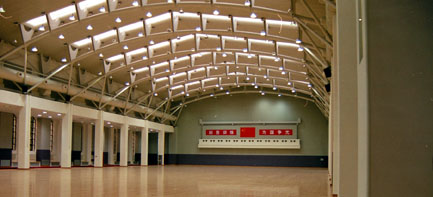Other stories on Education & Campus Life: Combatting budget cuts: universities have different tricks up their sleeves |
Sports
Special
scheme aids athelets with lower exam results
By
Fung Ying
The Sports Scholarship Scheme helps students with exceptional sports achievements to enter universities with less outstanding examination results.
The University of Hong Kong admitted two athletes when the scheme was first introduced in 1995.
It was a pilot scheme and the University of Hong Kong was the only university that took part in it.
In 2003, four tertiary institutions participated in the scheme, namely The University of Hong Kong, The Chinese University of Hong Kong, City University of Hong Kong and Hong Kong Polytechnic University.
Dr. Dennis Whitby, assistant director of Competitive Sport and Recreation at the University of Hong Kong, said that the scheme aims to reward top international athletes.
Said he: “The scheme offers an opportunity for the athletes to continue their studies even if most of their time is spent on intensive training.”
Said Amy Chan, athlete affairs manager for the Hong Kong Sports Development Board: “The Scheme not only gives athletes chances of further study, but also motivates them to have better achievements in sports.
“University students should be all-rounded.
“Outstanding sports achievement should also be counted in judging a student’s abilities.”
The University of Hong Kong sets aside a $150,000 fund for athletic scholarships. It usually issues scholarships to 15 athletes, each with $10,000.
This year, the university has accepted 20 student athletes.
Elaine Chan is manager of the Sports Scholarship Scheme at the University of Hong Kong.
She said, “The University selects applicants by examining both their academic work and sports achievements. Applicants must be independent and be able to think logically.”
Student athletes are required to satisfy the basic entry requirements for the university and for the relevant faculty.
Ms. Chan emphasized that the scheme does not affect the admission of normal students, because there are extra quotas for sports scholars.
Jie Elyni is a former Hong Kong badminton team player and now a Year 2 student in the Department of Sports Science and Leisure Management at the University of Hong Kong.
Miss Jie said some professors, teachers and schoolmates are biased against her.
“Some people think that universities offered us places only because of our sports achievements.
“They assume that we are incompetent academically.”
Chow Chiu Nam, a triathlon athlete, studies information systems at the City University of Hong Kong. She acknowledges the assistance provided by the Sports Development Board.
The board recommended 18 student athletes to universities this year.
“The Sports Development Board not only advises us which institutes and disciplines to choose, but also provides us mock interviews to prepare us well. They really help us a lot,” said she.
As a triathlon athlete, she must work out every day, for 22 to 25 hours a week.
“Some classmates despise me for obtaining a place in the University with lower examination grades.
“However, we actually put in more effort than any other students do. ”
Mainland athletes

Modern facility for student athletes in Beijing. (Fung Ying)
By Fung Ying
Chow Ting Yu, 25, is a member of Hong Kong wushu team. He enrolled in Beijing Sports University through the sports system in China in 2000.
He was the gold medallist in men’s sword in the Fourth World Wushu Championships in 1997. In 1999, he took home the gold medal of men’s qiangshu in the Fifth World Wushu Championships.
He is classified as “national class”, according to the assessment scale adopted by the State Sport General Administration in China.
Beijing Sports University admits national class athletes from China, Hong Kong and Taiwan, regardless of their academic results.
The university supports athletes and sports development. Getting championships in open competitions in China or international tournaments could be counted as credits.
Said Chow: “In Beijing, I improved a lot in Wushu through the tough training. I enjoy being here.”